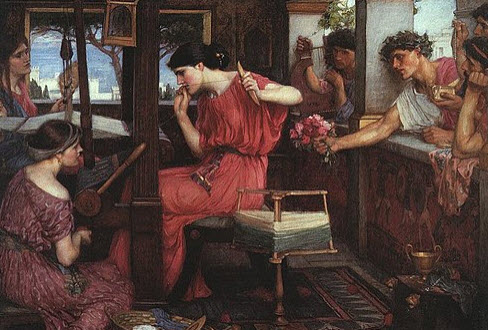Guest Blogger and long-time Council friend, Bob W. presents Part 37 of a series dealing with Alcoholism and Addiction from a Mystical, Mythological Perspective, reflecting Bob’s scholarly work as a Ph.D. in mythological studies.
 The story of Homer’s Odyssey, to which we keep returning as a classic Hero’s Journey, ends with Odysseus finally back in Ithaca reunited with his family. He has traveled all over the Aegean and Mediterranean Seas in a ten year quest to get here, suffering all kinds of ills, some incredibly gruesome, but many of his own making. His long journey to get home has caused many to believe that he is dead and, as a result, his Kingdom on Ithaca has been overrun by young men seeking to convince his wife, Penelope, to recognize that as fact and marry one of them, so that he could become King.
The story of Homer’s Odyssey, to which we keep returning as a classic Hero’s Journey, ends with Odysseus finally back in Ithaca reunited with his family. He has traveled all over the Aegean and Mediterranean Seas in a ten year quest to get here, suffering all kinds of ills, some incredibly gruesome, but many of his own making. His long journey to get home has caused many to believe that he is dead and, as a result, his Kingdom on Ithaca has been overrun by young men seeking to convince his wife, Penelope, to recognize that as fact and marry one of them, so that he could become King.
These men, called the Suitors in the Story, occupy a significant part of the Tale. Their activities in Odysseus’ Palace over the last year of the Story, begin to turn ugly as they abuse the hospitality of Penelope and engage in long bouts of consumptive behavior with food, wine and the handmaidens of the Palace. Odysseus’ return to Ithaca, in the final elements of the Story, leads him to plan and then execute a complete slaughter of these Suitors to regain his rightful place as King.
The place of these Suitors has always intrigued me. What might they symbolize, mythologically, in the Story? It seems that they represent much of what was unacceptable in the ethos of ancient Greece of the time. They lacked a fundamental sense of right behavior, abusing the hospitality of Penelope and her household, consuming her goods and possessions beyond any sense of decorum, and abusing the members of her household ad infinitum. They were just really bad actors, maybe not unlike all of us as we acted out in the heights of our disease.
I have come to believe that, to get sober, something inside of us has to die, at least metaphorically speaking. Some element of our addictive selves must come to a decisive end, for us to gain Sobriety and maintain a sober state in our ongoing life. So maybe this is what we can capture from this part of the Odyssey, the need for Odysseus to engage in a brutal battle with all the elements of the wicked side of his Kingdom is mirroring what we must do in our pursuit of Sobriety. It easily conveys to many of us the need to control, maybe destroy, through a rigorous working of the Steps, those parts of us that could re-ignite the worst elements of our disease. Our future in the Sunlight of the Spirit only happens, and stays alive then, when the “suitors” in us are long since dead.
